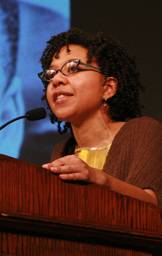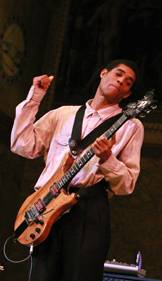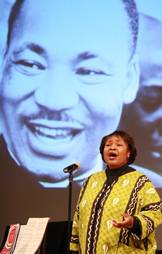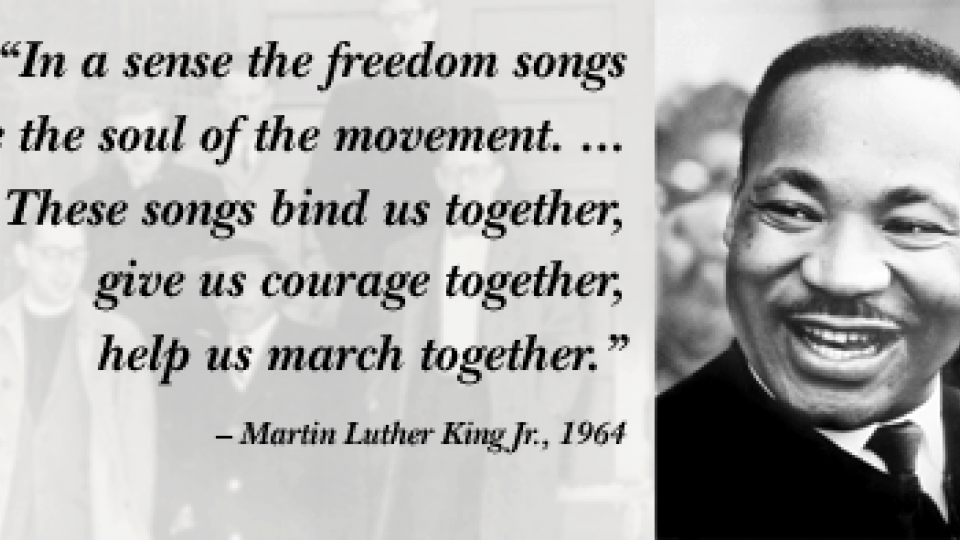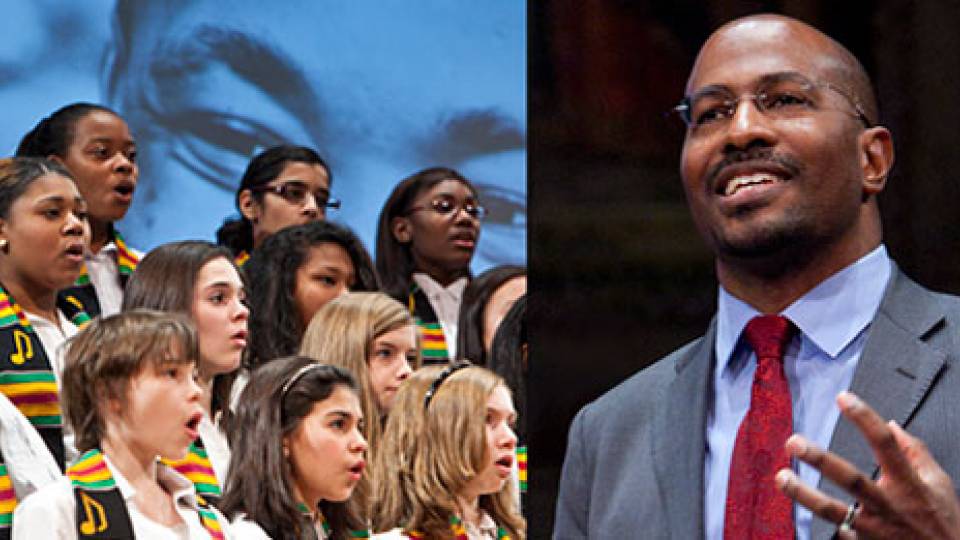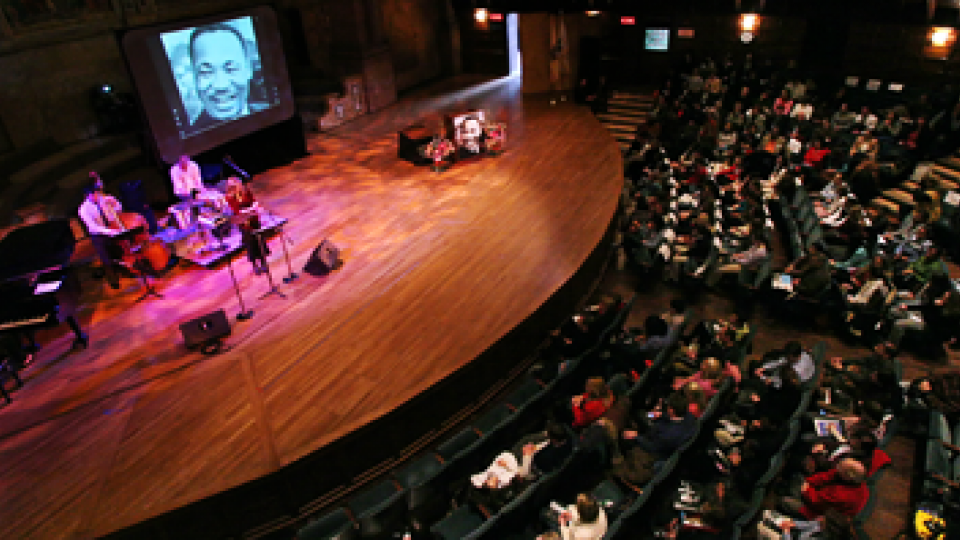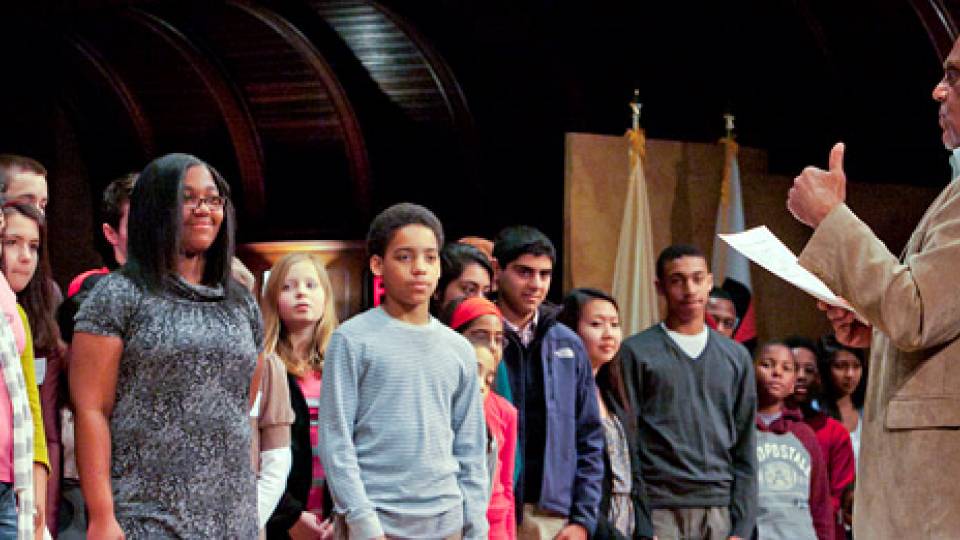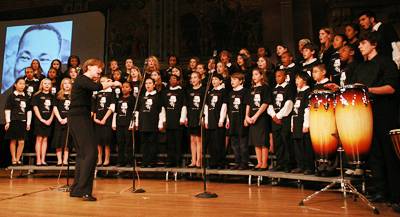
Princeton University honored the memory of Martin Luther King Jr. on
Jan. 15 in Richardson Auditorium with a celebration of the
inspirational power of music.
The annual King Day ceremony featured a performance by acclaimed jazz
guitarist Stanley Jordan, a 1981 Princeton graduate, and a keynote
address by Princeton scholar Daphne Brooks, who traced music's central
role in African Americans' struggle for equality from the days of
slavery to the aftermath of Hurricane Katrina.
Students from area schools also were honored for their entries in an
essay, poster and video contest focusing on music of the human rights
movement. The event reflected the important influence of music in the
work of King, who often invoked musical terminology or employed song
lyrics to emphasize key messages in his speeches.
"As the compelling entries in our essay, poster and video contest
demonstrate, music has the power to capture the convictions and
emotions that underpinned the civil rights movement and other struggles
for social justice," Princeton President Shirley M. Tilghman said in
opening remarks. "Songs like 'We Shall Overcome,' 'I Shall Not Be
Moved' and 'Oh Freedom' are filled with hope and resolution,
transcending racial differences and inspiring both the singer and the
listener to imagine and work toward a more perfect union."
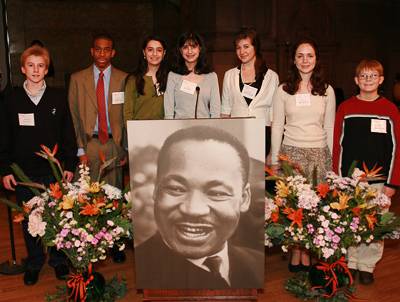
In her address, Brooks noted that the soundtrack of the civil rights
movement in the 1960s -- works from artists such as Fannie Lou Hamer,
Nina Simone, Curtis Mayfield, James Brown and Aretha Franklin -- was
built upon "liberation themes expressed in divinely revolutionary music
from the previous century," which also empowered King and other
activists.
"We ought to think of King and more broadly this generation of brave
and wondrous activists as bold architects and arrangers of radical and
revisionist sound that served as a spiritual 'safety zone' of sorts for
marchers who faced everyday danger and as a form of spontaneous social
documentation that caught and preserved history-making events in song,"
Brooks said. "It was a sound that galvanized the masses."
Brooks, an associate professor of English and African American studies
who focuses on African American literature and culture, noted that the
struggle for liberation continued to find expression in the music of
Marvin Gaye, Isaac Hayes and Stevie Wonder in the 1970s, Living Colour
in the 1980s and, most recently, R&B singer Mary J. Blige in the
wake of Hurricane Katrina. Brooks cited Blige's performance in a
powerful remake of the U2's hit song "One" -- in a duet with U2 singer
Bono during a 2005 Katrina relief concert -- as a poignant reminder of
black females' suffering in American culture.
As America faces a "current era of a seemingly unending war, poverty
and an African AIDS pandemic that demands our attention," Brooks said
the need for musical activism carrying the spirit of Martin Luther King
Jr. must continue. She pointed to the Willie Mae Rock Camp for Girls in
New York -- a camp named for African American rock and blues pioneer
Big Mama Thornton where Brooks taught last summer -- as one possible
source of inspiration for this next generation.
"Here's hoping that the next revolution is already under way at Willie
Mae, where music for a new movement, for a new generation and embodied
by girls ages 8 to 18 of all colors, multiple religions, from all over
the world -- who are armed with bass, drums, guitars, keyboards, two
turntables and microphone -- are ready to change the world and ready to
turn up the volume so that we can hear, feel, nod your head and rock
out to King's message in stereo for years and years to come," Brooks
said.
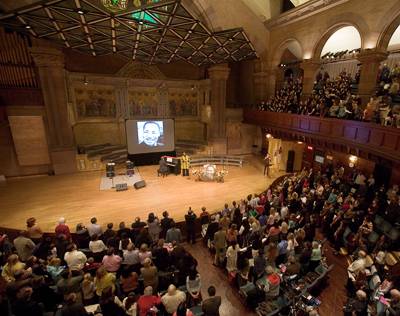
In remarks during his performance, Jordan also offered a testament
to the influence of King and the musical activists of the 1960s and
1970s, saying he gained "courage from Dr. King to pursue my dream in
the music world" by realizing he needed to stand firm to his own
beliefs and try to create music that would make a contribution to
society.
"Through trial and error, I discovered that the best way to make it
through this industry I'm in is to stick to my principles and not to
follow what people say," he said.
Jordan played a four-song concert for the standing-room-only crowd at
Richardson, including simultaneous performances on guitar and piano.
His set included "Happy Birthday," a tribute to King written by Stevie
Wonder, who championed the recognition of King's birthday as a national
holiday.
The event also included selections by a combined group representing the
Trenton Children's Chorus Covenant Singers and the Princeton Day School
seventh- and eighth-grade choir and by Rochelle Ellis, a soloist who
has performed around the country and a voice instructor at
Westminster Choir College of Rider University.
A Webcast of the event will be archived on the Webmedia site.
